Key takeaways:
- Feedback is essential for effective communication, fostering personal and professional growth when embraced reflectively.
- Constructive feedback should be clear, framed positively, and delivered in the right context to promote open dialogue and growth.
- Receiving feedback positively involves pausing to reflect, expressing gratitude, and viewing it as a learning tool rather than criticism.
- Measuring growth from feedback includes tracking progress, maintaining a log, and assessing impacts on relationships and team dynamics.
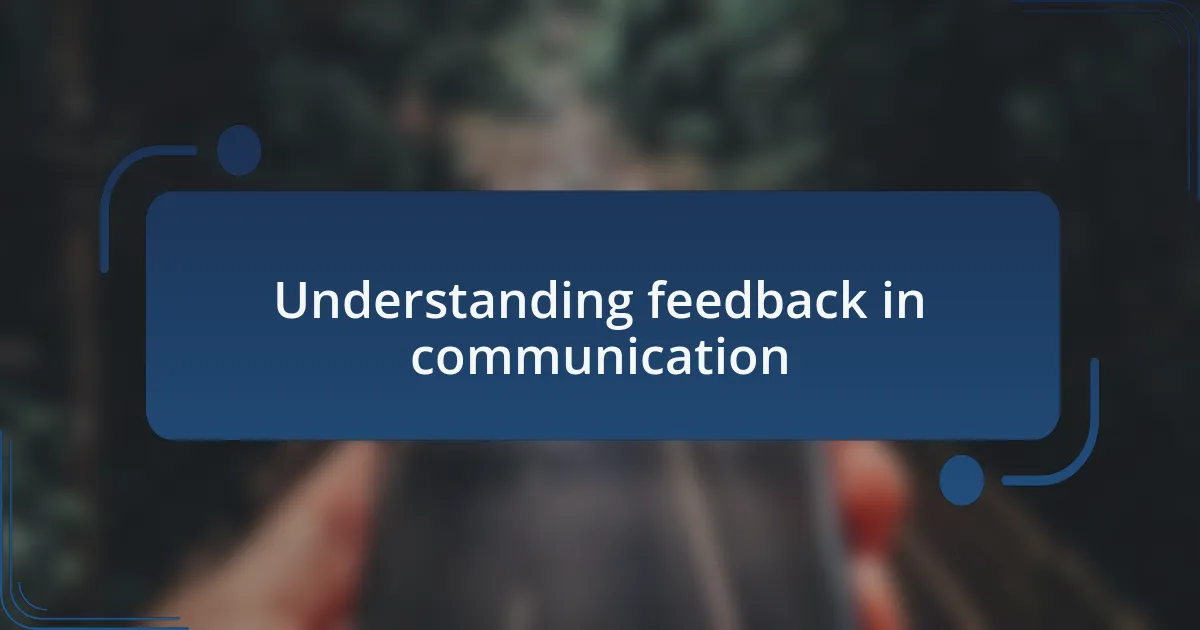
Understanding feedback in communication
Feedback is a vital element in effective communication, serving as a mirror that reflects how others perceive our messages. I remember a time when I presented an idea to my team, and their feedback highlighted aspects I hadn’t considered. It was eye-opening! Have you ever received constructive criticism that changed your perspective?
When I think about the emotional weight of feedback, I recognize that it can feel vulnerable to open ourselves up to others’ opinions. Yet, that vulnerability can lead to profound growth. I once hesitated to share my thoughts in a group setting. But after embracing feedback, I discovered I could connect more deeply with my colleagues.
Understanding feedback is not just about listening; it’s about interpreting and integrating those insights into our communication strategies. I’ve learned that asking for clarification helps unravel misunderstandings. Have you ever felt lost after receiving feedback? By seeking clarity, we can transform confusion into constructive action, enhancing our overall communication.
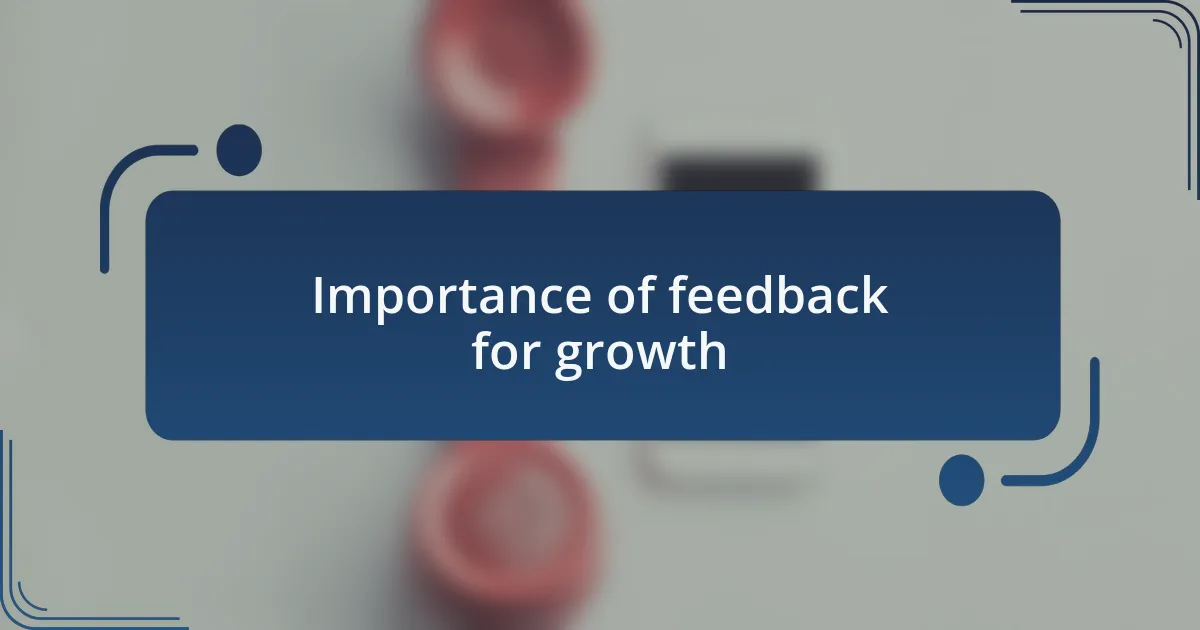
Importance of feedback for growth
Feedback acts as a catalyst for personal and professional growth. I recall a situation where a mentor offered me insights on my presentation style, pointing out how my nervous habits distracted from my message. Initially, it stung, but reflecting on that feedback allowed me to refine my delivery, turning what felt like criticism into a valuable growth opportunity. Have you ever experienced a shift in your skills after receiving a hard truth?
Moreover, embracing feedback requires a mindset shift—seeing it not as a judgment but as a tool for evolution. During a challenging project, I sought my teammates’ opinions on my approach. Their varied perspectives illuminated blind spots I hadn’t recognized, ultimately leading to a more robust final product. Imagine if I had dismissed their input; I would have missed out on significant learning!
In the grand scheme of growth, feedback fosters deeper relationships and creates an environment where continuous improvement thrives. I remember asking a colleague for thoughts on my written communication, and their suggestions not only enhanced my writing but also strengthened our working relationship. Have you thought about how sharing feedback can forge connections that go beyond mere collaboration?
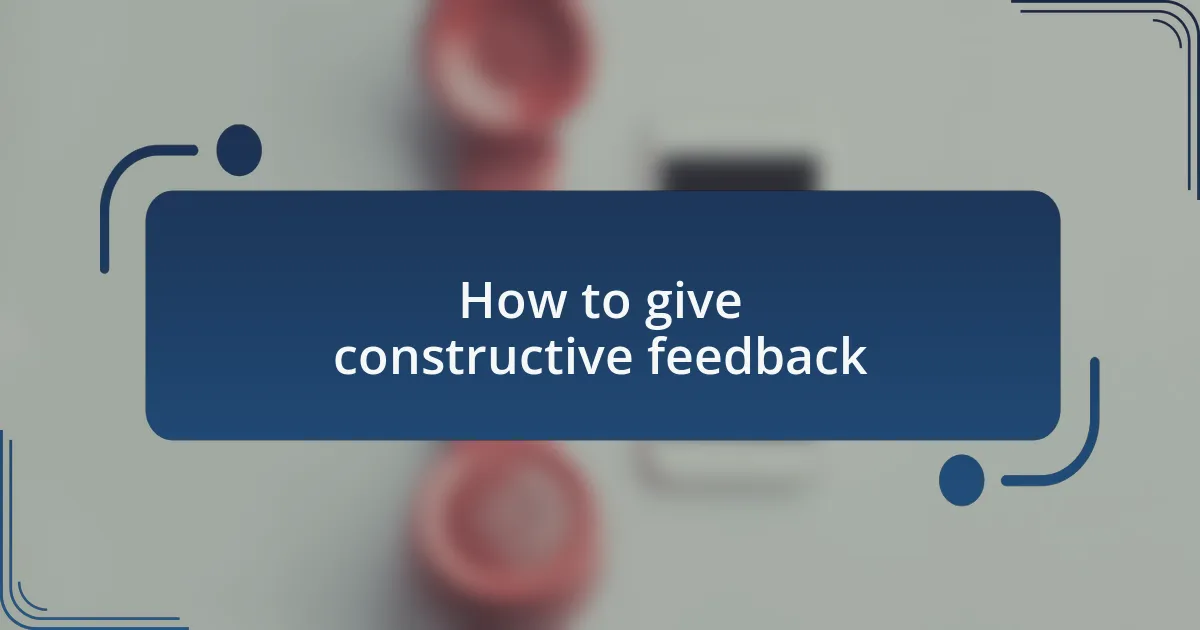
How to give constructive feedback
When it comes to delivering constructive feedback, clarity is key. I once had a manager who took the time to explain specific behaviors rather than general sentiments during our performance reviews. The focused nature of her comments made it easier for me to understand what to change. Have you ever left a feedback session unsure of what to improve? It’s an experience I wouldn’t wish on anyone.
Another effective strategy is to frame your feedback positively. I remember giving input to a peer about a project they were passionate about. Instead of solely addressing the flaws, I highlighted what I admired first before suggesting improvements. This approach created a more open dialogue and encouraged them to embrace the input rather than feel defensive. Isn’t it interesting how a little positivity can make a big difference in how feedback is received?
Finally, timing and setting matter significantly. One challenge I faced was providing feedback during a stressful moment for my team. It didn’t go well, and I learned that finding the right time to discuss sensitive issues can transform the conversation. Picture a casual coffee chat instead of a tense meeting room; it changes the whole energy, doesn’t it? By choosing the right environment, feedback can become a collaborative journey toward growth rather than a source of anxiety.
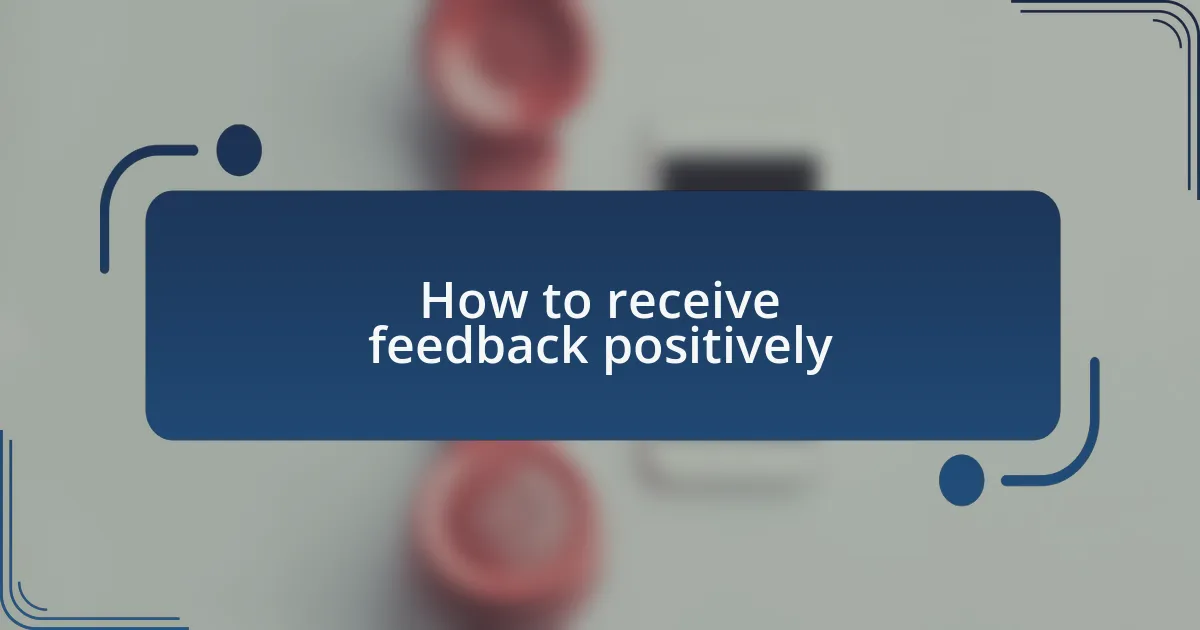
How to receive feedback positively
Receiving feedback positively can really transform how we perceive our growth journey. I recall a time when I received criticism on a project I was passionate about. Initially, my instinct was to feel defensive, but I chose to pause and listen. That moment of reflection allowed me to sift through the comments and recognize the valuable insights embedded within them. Have you ever caught yourself reacting too quickly instead of embracing the opportunity to learn?
Another key approach is to express gratitude when receiving feedback. After a presentation, a mentor once told me to thank them for their honesty, regardless of the nature of the feedback. This practice not only helped to cultivate a more positive environment but also encouraged others to share their thoughts more freely. Can you imagine how much richer discussions become when everyone feels appreciated?
Lastly, it’s essential to view feedback as a tool for learning and not just an assessment. I shifted my mindset from seeing feedback as criticism to viewing it as a guide to improvement. Once I embraced this perspective, I found myself actively seeking out constructive criticism, knowing that each piece offered a pathway to my development. What if we all approached feedback with this mindset—how much quicker could we grow?
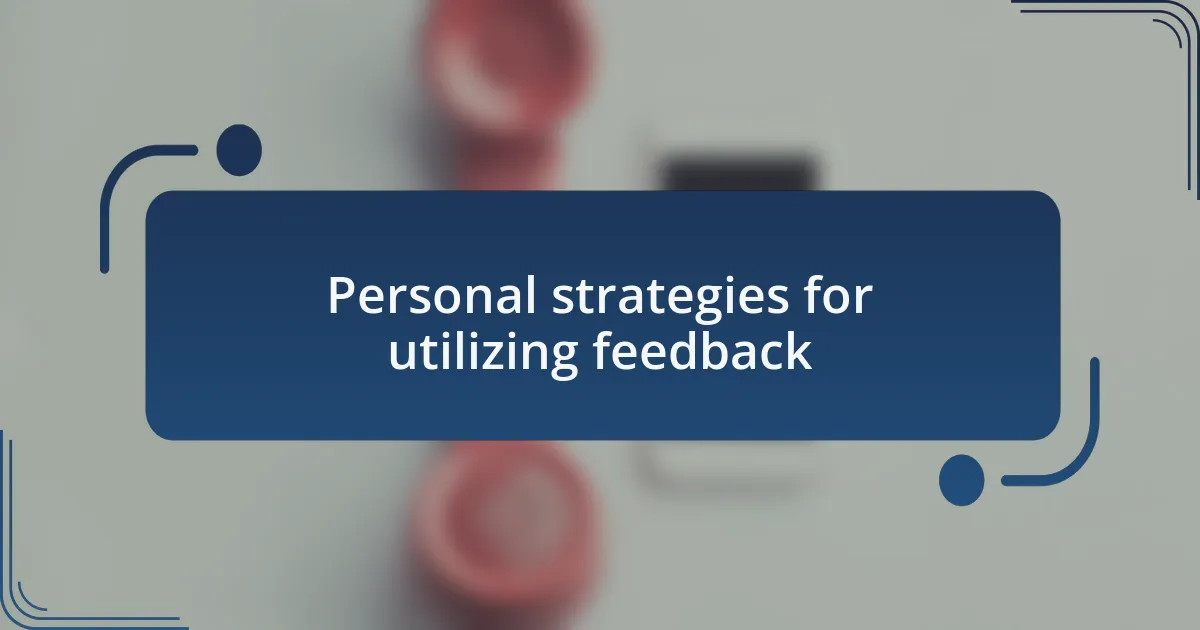
Personal strategies for utilizing feedback
When it comes to utilizing feedback effectively, I find it invaluable to create a dedicated space to reflect on the insights I’ve received. For instance, after completing a significant project, I often sit down with a notebook to jot down key takeaways from the feedback. This simple act of writing not only clarifies my thoughts but transforms vague comments into actionable steps I can take moving forward. Have you ever noticed how writing can help crystallize your understanding?
Another essential strategy I employ is engaging directly with the person who provided feedback. I’ve learned that having an open dialogue can help me grasp their perspective more deeply. I once set up a follow-up chat with a colleague after receiving mixed reviews on my communication style. During that discussion, I discovered dimensions to the feedback I hadn’t considered, which ultimately allowed me to refine my approach. Isn’t it fascinating how conversations can unveil layers of meaning that might otherwise remain hidden?
Lastly, I prioritize setting specific goals based on the feedback I receive. This is something I’ve recently started doing after realizing that vague intentions often lead to little change. For example, after I received input about improving my public speaking skills, I committed to attending workshops and practicing regularly. Tracking my progress in this way has been incredibly motivating; it allows me to celebrate even small victories along the path to improvement. Doesn’t it feel empowering to see how feedback can translate into tangible steps for growth?
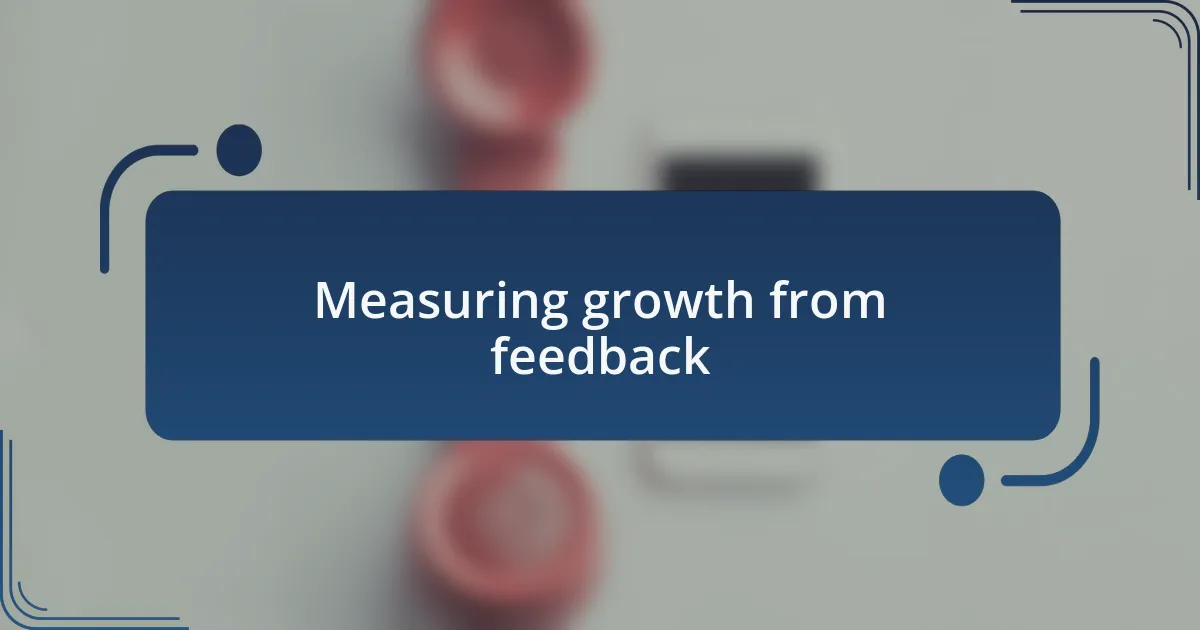
Measuring growth from feedback
Measuring growth from feedback is often about recognizing the small victories along the way. I remember when I first received feedback on my project management skills. Instead of feeling disheartened, I began to track the specific areas identified for improvement. Each time I implemented a suggested change, I noted my progress and noticed how my confidence skyrocketed. Isn’t it amazing how tangible metrics can help quantify what often feels like a subjective experience?
Sometimes, I find it helpful to reflect on feedback over time. I maintain a feedback log, and every few months, I review past notes to see if my improvements are consistent. This practice surprised me recently when I realized that I had completely transformed my approach to team communication. Looking back, I could see the growth was not just from a single project, but from a continuous journey of applying what I learned. Have you ever taken the time to look back at your past feedback and notice how far you’ve come?
Additionally, I often assess how feedback impacts my relationships and collaborations. After focusing on a colleague’s comments about my listening skills, I noticed a change in team dynamics. Open discussions became more frequent, and ideas flowed more freely among us. Observing this shift made me realize that measuring growth is not only about personal progress but also about enhancing connections with others. Isn’t that the true essence of growth?